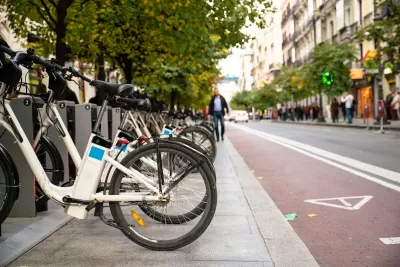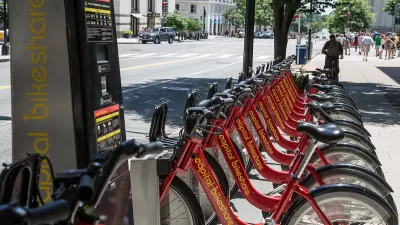Research reveals that shared bikes and scooters are often a crucial lifeline for low-income workers, signaling a need to include micromobility in the larger public transit conversation.

A study of survey data from the United States, Australia, and New Zealand sheds light on how low-income people use shared micromobility services, indicating an opportunity for cities to improve transportation services for the workers who need them most.
Kea Wilson outlines the findings in Streetsblog USA, writing, “Participants in the Lime Access program, which grants discounts of around ‘70 or 80 percent’ to riders who qualify, were significantly more likely to list essential reasons like ‘shopping’ for groceries (35 percent) and ‘commuting’ (31 percent) than non-Access riders, 11 and 21 percent of whom rode to complete errands or go to work, respectively.”
The study found that lower-income users were very unlikely to use shared mobility for non-essential reasons. “And a whopping 44 percent of their trips connected to a traditional transit ride, compared to just 23 percent of people who paid full price.”
As Wilson notes, “Perhaps the most surprising findings, though, were riders' qualitative responses about what micromobility meant to them, and how their lives were made better by having access to affordable ways to get around without a car.” According to Calvin Thigpen, director of policy research for Lime and co-author of the report, “People are using this to get around for pivotal trips; they are heavy, often daily users.”
However, most U.S. bike share systems are not subsidized by public funding, meaning any equity programs cut into the operators’ profit margins. Planetizen recently covered Houston BCycle’s decision to shut down that program due to funding problems. For Thigpen and other advocates, this signals a need to support and fund shared mobility programs as an integral component of an accessible, comprehensive public transit system.
FULL STORY: Study: How Low-Income People Really Use Micromobility

Planetizen Federal Action Tracker
A weekly monitor of how Trump’s orders and actions are impacting planners and planning in America.

Congressman Proposes Bill to Rename DC Metro “Trump Train”
The Make Autorail Great Again Act would withhold federal funding to the system until the Washington Metropolitan Area Transit Authority (WMATA), rebrands as the Washington Metropolitan Authority for Greater Access (WMAGA).

The Simple Legislative Tool Transforming Vacant Downtowns
In California, Michigan and Georgia, an easy win is bringing dollars — and delight — back to city centers.

The States Losing Rural Delivery Rooms at an Alarming Pace
In some states, as few as 9% of rural hospitals still deliver babies. As a result, rising pre-term births, no adequate pre-term care and "harrowing" close calls are a growing reality.

The Small South Asian Republic Going all in on EVs
Thanks to one simple policy change less than five years ago, 65% of new cars in this Himalayan country are now electric.

DC Backpedals on Bike Lane Protection, Swaps Barriers for Paint
Citing aesthetic concerns, the city is removing the concrete barriers and flexposts that once separated Arizona Avenue cyclists from motor vehicles.
Urban Design for Planners 1: Software Tools
This six-course series explores essential urban design concepts using open source software and equips planners with the tools they need to participate fully in the urban design process.
Planning for Universal Design
Learn the tools for implementing Universal Design in planning regulations.
Smith Gee Studio
City of Charlotte
City of Camden Redevelopment Agency
City of Astoria
Transportation Research & Education Center (TREC) at Portland State University
US High Speed Rail Association
City of Camden Redevelopment Agency
Municipality of Princeton (NJ)





























